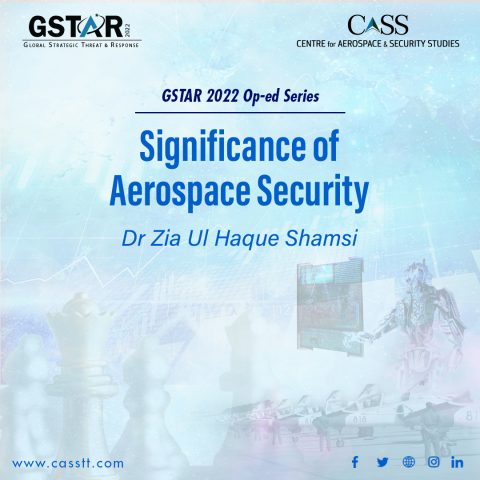The International Conference on Global Security Threat and Response (GSTAR-2022) was organised by Islamabad’s leading think-tank, the Centre for Aerospace & Security Studies (CASS) on 19-20 October 2022. One of the primary purposes of the Conference was to review aerospace security at global as well as regional levels, for which subject experts from across the globe were invited to speak in a hybrid mode. Those distinguished speakers who could not present their papers in person made virtual presentations.
The speakers dilated on the significance of aerospace power and there was consensus that aerospace security is going to be a major concern for all stakeholders in the coming decades.
Taking a line from Professor James Wirtz, there is a general tendency among the global players not to criticise each other for developing a particular weapon system, no matter how harmful it may be to humanity. Perhaps, because the other party might also be in pursuit of the same and may be inching closer to declaring it. We saw this happening when the United States started its space programmes under the National Aeronautics and Space Administration (NASA) in 1958, whereas the erstwhile Soviet Union had already sent Sputnik 1, ‘into an elliptical low Earth orbit by the Soviet Union on 4 October 1957 as part of the Soviet space program.’
Similarly, the nuclear weapons programme was developed by the then superpowers nearly simultaneously, though covertly for obvious reasons, and followed by other major powers very closely. Though China was not a major power in any sense at that time: economically or militarily, it followed suit and joined the P-5 Club before the Non-Proliferation Treaty could come into force in 1970 and extended for an indefinite period in 1995. In fact, James rightly concluded that a few developed nations are slowly moving the “arms race in space” and carefully watching each other from close ranges. I am of the opinion that the activities in space will continue to gather pace with reference to employment in the domain of cyber warfare as part of the larger framework of hybrid war.
Another lesson that could be drawn from GSTAR-2022 is to understand the developments in warfare. Air Commodore Shaun Clark was of the view that the developments in aerospace with respect to Unmanned Aerial Vehicles (UAVs) will continue and their banning would be a great challenge. However, the cycles of measures, countermeasures, and counter-countermeasures (CCMs) will also continue to ensure a fine balance. Shaun’s conclusion is that any machine developed by humans has more tolerance to strategic forces than the physiological capabilities of the human body and therefore, it would more logically attract the attention of the user to replace men, particularly in the aerospace domain.
However, the question would remain about the credibility of the technology and its cost effect, more so when it is deployed by developing nations. In the same context, another question is would cutting-edge technology be offered and transferred to all developing nations or not. However, I agree with Shaun that the smaller and less developed nations must participate in the development of their space programmes and ‘insist on international forums on the development of both law and institutional enforcement just as nuclear capability has its laws and institutions.’
Dr Damon Coletta made an interesting assertion that he views air power as distinct from space power, and instead advocated for a combined arms philosophy where various types of combat instruments will be placed under a commander who would employ them as and when operationally required. On the other hand, Dr Saania Abdullah was of the view that Pakistan should enhance its cooperative engagement with the US and other powers in the domain of space development. In the domain of UAVs, she viewed that the problem remains that if it is hacked, its data could be exploited by the adversary, and the nations which are not that smart in cyber security measures would be the ultimate loser.
While a number of lessons could be drawn from GSTAR-2022 in the domain of global security, particularly due to an ongoing full-blown war between Russia and Ukraine, perhaps the experts’ concerns on aerospace security cannot be over-emphasized and need to be focused as a national priority.
The writer is the author of the book ‘Nuclear Deterrence and Conflict Management Between India and Pakistan’. He is presently working as the Director (Peace and Conflict Studies) at the Centre for Aerospace & Security Studies (CASS), Islamabad, Pakistan. The article was first published in Daily Times. He can be reached at cass.thinkers@gmail.com.




